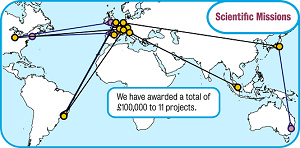LeviNet provides early career research (PhD students and Postdocs) the opportunity to undertake a short scientific mission, with the aim of building their own network and achieving their scientific goals.
Each mission relieves £5000 funding to cover travel & accommodation and another £5000 to use on research funds such as scientific equipment. Our goal is to prioritize applications where either the applicant is from a small research group, or the applicant will be joining a small host research group.
Ten LeviNet members have been awarded the funding for missions over 2 application rounds. We are seeing great connections forming as well as publications from the work carried.

Short Scientific Missions- Round 1
The first round of SSMs (short scientific missions) took place in 2023 and saw LeviNet members form exciting collaborations around the world.
Congratulations to the following successful candidates.
| Name | Host University | Home University | Mission Topic | |
| Chenyue Gu | Masaki Ando’s group, University of Tokyo Tracy | Australian National University | Characterization of high-quality small mirrors or the experiments of the suspended torsion pendulum | |
| Carlos Gutierrez Ariza | Tracy Northup’s group, University of Innsbrck | University of Granada | The dynamics of a chain of charged microparticles | |
| Shaun Laing | Andrew Geraci’s group, Northwestern University | University of Granada Swansea | Develop better methods to calculate and model light scattering effects in nonspherical levitated particles | |
| Rafael Mufato | Hendrik Ulbricht’s group, University of Southampton | University Pontifical Catholic University of Rio de Janeiro | Nonlinear forces, surfaces and levitated nanoparticles |
Short Scientific Missions- Round 2
The second round of SSMs are taking place in early 2024 and see more exciting collaborations formed around the world with LeviNet members.
Congratulations to all successful candidates in this round of Missions.
| Name | Host University | Home University | Mission Topic | |
| Joel K Jose | Dr Andrea Vinante’s group CRN – Instituto di Fontanica e Nanotecnologie, Trento, Italy | The Agency for Science, Technology, and Research (A*STAR) | Superconducting levitation of ferromagnetic microparticles for quantum sensing | |
| Bart Schellenberg | Daisuke Akamatsu’s group -Yokohama National University, Japan | University of Groningen, the Netherlands | Precision measurements using cold atoms and molecules | |
| Tatiana Guimarães | Peter Barker’s group – UCL, UK | Pontifical Catholic University of Rio de Janeiro – Brazil | Photon-number statistics of quantum light and recoil heating of a levitated nanoparticle | |
| Dr Joanna Zielinska | Prof. T. Guerreiro’s group – Pontifical Catholic University of Rio de Janeiro. | ETH Zürich, Swirzerland | Understanding orientational dynamics in a dark focus trap | |
| Shah Jee Rahman | Markus Aspelmeyer’s group – University of Vienna, Austria | Material Physics Center – San Sebastian, Spain. | Quantum control of optically levitated high index of refraction particles with high order spatial modes | |
| Miriam Martinez | Andrew Geraci’s group – Northwestern University | University of Innsbruck, Austria | black-body decoherence, which arises frominternal heating in levitated particles due to absorption in a vacuum environment |
